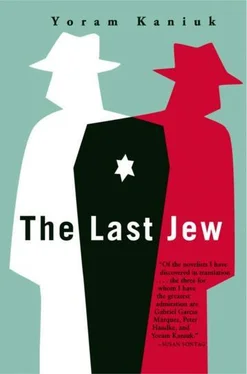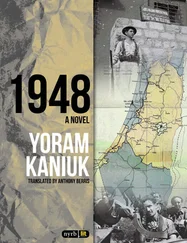Ebenezer stopped all at once, looked at the German who sat with his glasses still on his nose and the papers in front of him on his lap. The German wanted to continue, now he'd have to finish. He smiled at Ebenezer as if he were giving him a grade, as if he loved how Ebenezer filled in the crossword for him with a small square of knowledge, of words, and he continued…
… Samuel found one of his mother's dresses under the ass of a Polish guard. The guard was sitting in an armchair in the yard, next to the gate to the latrines and fucking a little girl who looked like a skeleton. Then he got up and Samuel slipped away, cut out a strip of fabric from the dress, and hid the fabric in his pocket. I loved-or perhaps the word "love" doesn't suit this journal-I sympathized with the way Samuel knew how to play the poor Jew and the soldiers loved the game, too. He knew you had to live another day. Another day, another two days, and that's how he got to the end. Chaos reigned. The radio didn't tell us the truth until the last moment. Documents had to be destroyed, burned, purged, and suddenly everything was over. So it wasn't Samuel's humble and disciplined attitude that saved him, but the disorder that ruled during the destruction of the camp. But when he did play it was a beautiful game. I loved to see his downcast look, his eyes running around like the eyes of a trapped mouse. No, he wasn't afraid, he wanted them to think he was afraid, it was just as amusing as the small and doleful choir in torn shoes that came from the eastern front to entertain us and the people in it stood shocked, split, hungry, and tried to make us laugh, and they dropped to the ground out of fatigue and hunger and Samuel stood there, I saw him, and peeped at them. He examined their acting ability, that beautiful bastard…
Germanwriter, who had stood and read for some time now, fell asleep, knocking his head on the paper. I thought of Samuel Lipker looking for diamonds in rectums. The writer's glasses dropped off and fell to the floor. Fortunately for him the lenses were plastic. The light in the room was soft, and outside laborers were heard on their way to work. A car passed by in the empty street and made noise. Ebenezer gave me a long and vital look, as if he never slept, Renate wanted to go to her husband but couldn't. Ebenezer said: Poor Henkin! Samuel the great actor! Came to you and shuffled the cards for you, played your son, I wanted daughters from the German and you'll ask him for him. Samuel's not a bad man, just amoral, born without a mother and an evil grandmother raised him. I know her, she's my mother. The German's journal makes me laugh. Only a journal like that can make a man like me laugh.
No Samuel came to me, I said, tired, and part of me was already asleep. Did Boaz come to me? Ebenezer looked at me a long time and turned his face away, maybe I really did hurt him. Renate asked: Was there really a commander named Kramer?
He knew a little bit about the poem of wood, said Ebenezer, your husband is a good writer, maybe too good. What in fact happened to us, I met him years ago, didn't I?
Years ago, mumbled the German either asleep or terrified and then he stirred suddenly, with a kind of sharp and panicky waking, picked up his glasses, stretched his slightly crumpled clothes. He said: So many things ago!
What things? Ebenezer looked amused again. A puppet acts, I thought to myself. A person who builds gardens in the dark. An enormous need to know who he was stirs in me and gives no signs. He said: We sat and talked, I remember. I remember, more and more I remember who I am and why I am. And so the knowledge was forgotten and that's good. A human being will come from me yet. You wrote to me. Then the contact was broken. The scholars who studied me at the institute told me, He writes, he writes, and what did you write? A fictional journal. Listen, don't make me what I'm not. And we searched for one another, why? Can I know? You should know. Or Henkin who Samuel came to and stole his daughter-in-law Noga from him. Mrs. Henkin, I wanted to tell you words of an old man who loved only one woman in his life, you're a very handsome woman!
She thanked him, my wife, and smiled at me. That was her first smile at me in years.
I was terrified.
Who was Secret Charity? I asked.
The two of them looked at me and wanted to answer and then Ebenezer said, You'll know everything, Henkin, everything you'll know, what was over long ago is starting over… Look, it's morning now and before it was night. Maybe a new millennium is starting?
We went outside. The sun was already beating down and Renate was supporting my wife. We walked to the car. Ebenezer fell asleep on his feet. His wife dragged him inside and started lowering the shutters. Before he disappeared, his hat slipped off and he picked it up with some tired and clownish acrobatics. Renate sat behind the wheel and the writer fell asleep next to her. I shook the old man's hand. Renate kissed my wife, who bent over to her, she started the car, and drove off.
We went into the house. The heavy curtains preserved the night chill and for the first time in years we got into one bed together, dressed, but hugging, still silent. She kissed me softly and fell asleep. I wept but she didn't see. We woke up in the afternoon. We were hungry; we felt like two kids. We ate something Hasha Masha warmed up and we fell asleep again. This time we took off our clothes. We hugged, if we had been young we would have given birth to a son. The son would die afterward. But we were too old to give birth. It was beautiful to return to my wife's dark and fascinating openings. She hugged me and dug her fingernails into me. I thought to myself, She's become a cat, the mother of my dead son. We opened the windows and Hasha Masha made good coffee. A knock was heard on the door. I opened it and in the door stood Germanwriter and his wife. He was holding a big bouquet of flowers. We drank coffee, we looked at Ebenezer's house. The German said: Now he'll pretend to be sleeping. And indeed the windows were shut.
We got into the car and drove off. The road to Jerusalem was exciting as always. The German looked at the trees and the mountains and after the ardor of talking the night before the words seemed to have died out and were no longer stammered. Renate told how her son once took his sock, wiped his nose, and then put the sock back on. She laughed. Hasha Masha also laughed. The writer was tired and pensive. When we arrived, he said suddenly: What a beautiful place. We parked the car and walked on the path toward the cemetery. The light was savage but the trees soothed it. Their thick crests covered us. The path was full of dry and wet pine needles, the graves were lined up like a military parade. We stopped at Menahem's tombstone. His name was engraved in stone and so was his army number. I wanted to say something. And all I could say was, Here, next to Menahem, Yashka is buried. Yashka fell in one of the two battles in which Menahem was killed. Nothing is known about him except his name, he came to Cyprus in a ship of illegal immigrants, from Cyprus he came to Haifa and from there he went to the last battle he took part in. They weren't even sure of his name.
Meanwhile night fell. We stood there a long time. The moonlight that now beamed tried to save the horrifying sight of the dead lined up under the hewn stones. It all looked like a cheap stage set for something with no name, the pain, for some reason, maybe because of the passing night, was also fuller and more divided, desolate, and so I had nothing to say. I looked at my new friends, they guessed me correctly, I knew that from their faces. On the way back, the writer said: Who remains there, you or him?
I didn't answer, I thought. And then I said: Funny that Ebenezer thinks you wrote the journal. He didn't answer.
Читать дальше












